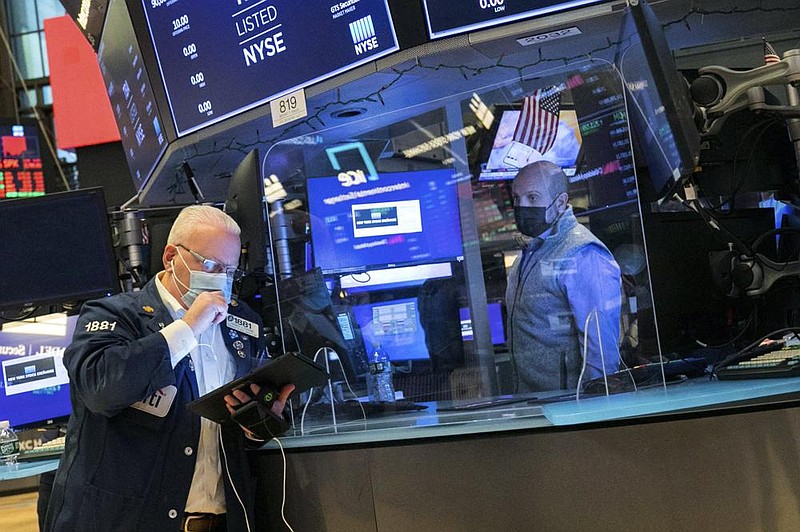NEW YORK -- Wall Street closed out its first losing week in three with another drop on Friday after reports showed the pandemic is deepening the hole for the economy, as Washington prepares to throw it another lifeline.
The S&P 500 fell 27.29, or 0.7%, to 3,768.25, with stocks of companies that most need a healthier economy taking some of the sharpest losses. The Dow Jones Industrial Average lost 177.26, or 0.6%, to 30,814.26, and the Nasdaq composite dropped 114.14, or 0.87%, to 12,998.50.
Treasury yields also dipped as reports showed shoppers held back on spending during the holidays and are feeling less confident, the latest in a litany of discouraging data on the economy.
Stocks have run out of steam since the S&P 500 set a record high a week ago amid optimism that covid-19 vaccines and more stimulus from Washington will bring an economic recovery. The S&P 500 fell 1.5% over the week.
[CORONAVIRUS: Click here for our complete coverage » arkansasonline.com/coronavirus]
Friday offered the first chance for traders to act after President-elect Joe Biden unveiled details of a $1.9 trillion plan to prop up the economy. He called for $1,400 cash payments for most Americans, the extension of temporary benefits for laid-off workers and a push to get covid-19 vaccines to more Americans. It certainly fit with investors' expectation for a big and bold plan, but markets had already rallied powerfully in anticipation of it.
Biden's Democratic allies will have control of the House and Senate, but only by the slimmest of margins in the Senate. That could hinder the chances of the plan's passage.
The urgency for providing such aid is increasing by the day. One report on Friday showed that sales at retailers sank by 0.7% in December, a crucial month for the industry. The reading was much worse than the 0.1% growth that economists were expecting, and it was the third straight month of weakness.
They followed a report from Thursday showing that the pace of layoffs is accelerating across the country.
Falling bank stocks were some of the heaviest weights on the market, even though several of the industry's biggest names reported stronger profits for the end of 2020 than analysts expected. Wells Fargo slumped 7.8%, for example, and Citigroup dropped 6.9%.
While the overall results were good, "bank earnings didn't exactly wow anybody," said J.J. Kinahan, chief strategist with TD Ameritrade.
Bank stocks had run up over the last few weeks on expectations that a stronger economy later this year and higher interest rates would mean bigger profits from making loans.
Like banks, stocks of smaller companies also fell more than the rest of the market in a mirror image of recent weeks. Smaller companies are seen as benefiting more from a healthier economy and stimulus from Washington than their bigger rivals, in part because they tend to have smaller financial cushions.
The Russell 2000 index of small-cap stocks lost 32.15, or 1.5%, to 2,123.20.
Even with Friday's drops, ebullience about a brighter economic future because of vaccines is keeping stocks near records and Treasury yields close to their highest levels since last spring. The Russell 2000 remains 7.5% higher for 2021 so far, towering over the S&P 500′s 0.3% gain.
On Friday, the yield on the 10-year Treasury dipped to 1.09% from 1.11% late Thursday.
In markets abroad, European stocks slumped, while Asian indexes were mixed.
Information for this article was contributed by Elaine Kurtenbach of The Associated Press.
